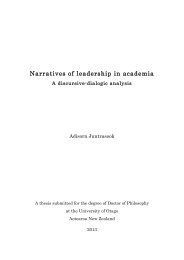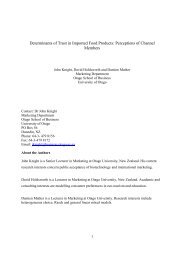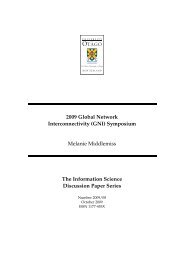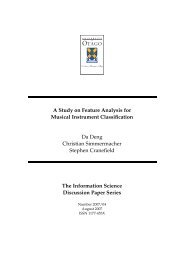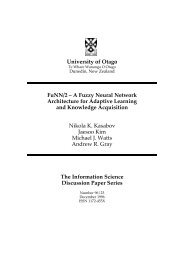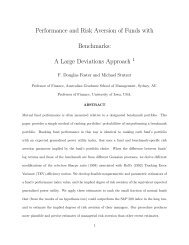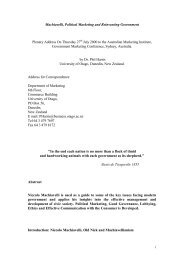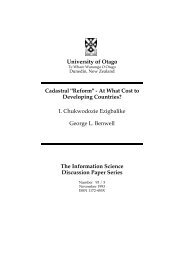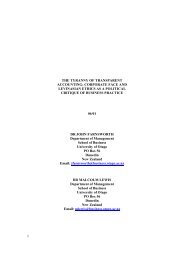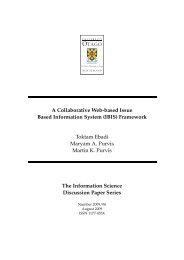Where is R2P grounded in international law? Anne-Marie Judson A ...
Where is R2P grounded in international law? Anne-Marie Judson A ...
Where is R2P grounded in international law? Anne-Marie Judson A ...
You also want an ePaper? Increase the reach of your titles
YUMPU automatically turns print PDFs into web optimized ePapers that Google loves.
Th<strong>is</strong> situation also constituted “a threat to <strong>in</strong>ternational peace and security” and<br />
therefore the Security Council was obligated to br<strong>in</strong>g those responsible to justice and<br />
to restore peace. Security Council Resolution 955 (1994) was adopted and the<br />
International Crim<strong>in</strong>al Tribunal for Rwanda was establ<strong>is</strong>hed. In the <strong>Anne</strong>x, the<br />
prosecutors of the International Tribunal for Rwanda were given the power to<br />
prosecute crimes aga<strong>in</strong>st humanity, which constituted a systematic and widespread<br />
attack aga<strong>in</strong>st the civilian population. These acts were constituted <strong>in</strong> Article 4 as acts<br />
“common to the Geneva” protocols, once aga<strong>in</strong> show<strong>in</strong>g that crimes aga<strong>in</strong>st humanity<br />
could only be prosecuted as ‘war crimes’. 310<br />
In regards to stand<strong>in</strong>g on its own as a d<strong>is</strong>t<strong>in</strong>ct and separate <strong>law</strong>, crimes aga<strong>in</strong>st<br />
humanity do not yet have th<strong>is</strong> advantage and therefore can only apply <strong>in</strong><br />
circumstances that are with<strong>in</strong> the jur<strong>is</strong>diction of war crimes. It therefore ra<strong>is</strong>es serious<br />
concerns over the application of <strong>R2P</strong> <strong>in</strong> regards to cit<strong>in</strong>g crimes aga<strong>in</strong>st humanity as a<br />
reason for <strong>in</strong>tervention <strong>in</strong>to the <strong>in</strong>ternal affairs of a state that <strong>is</strong> not currently <strong>in</strong> a<br />
conflict between two parties or more. The requirement that <strong>is</strong> <strong>in</strong>herent <strong>in</strong><br />
humanitarian <strong>law</strong> <strong>is</strong> that there are two parties or more <strong>in</strong> conflict or war with each<br />
other, not the state aga<strong>in</strong>st its citizens. Th<strong>is</strong> also ra<strong>is</strong>es other concerns for situations<br />
that do not strictly speak<strong>in</strong>g constitute a war or a conflict. Th<strong>is</strong> <strong>in</strong>cludes political<br />
upr<strong>is</strong><strong>in</strong>gs aga<strong>in</strong>st a state, or a similar situation whereby the state <strong>is</strong> not <strong>in</strong> direct<br />
conflict with a warr<strong>in</strong>g party but the very citizens that it <strong>is</strong> responsible for protect<strong>in</strong>g.<br />
These questions will be further clarified <strong>in</strong> Chapter 4 on Application and State<br />
Derogations <strong>in</strong> <strong>in</strong>ternational <strong>law</strong>.<br />
310 United Nations. (1994). United Nations Security Council 3453rd plenary meet<strong>in</strong>g on 8th <br />
November 1994 (S/RES/955) see also the letter of the Secretary-‐General on 1 st October 1994 <br />
(S/1994/1125) as well as (S/1994/879), (S/1994/906) and (S/1994/1157) <strong>Anne</strong>x i and annex <br />
ii) <br />
<br />
94



